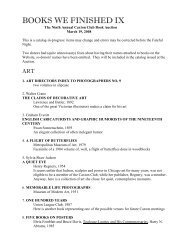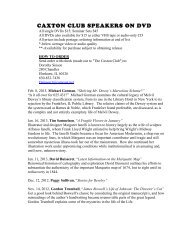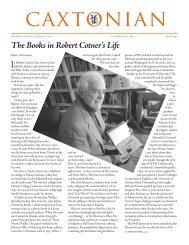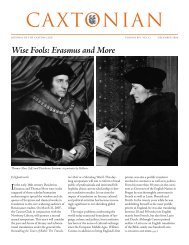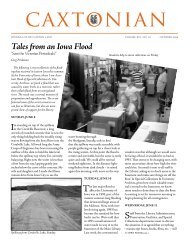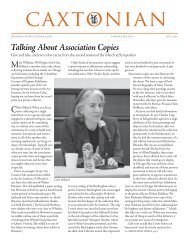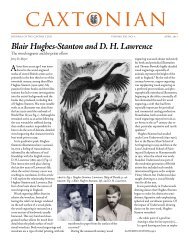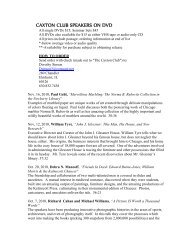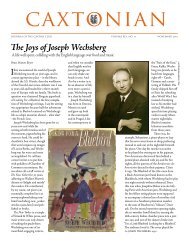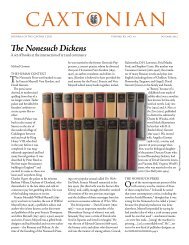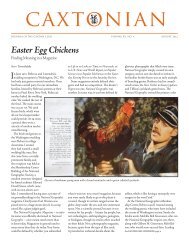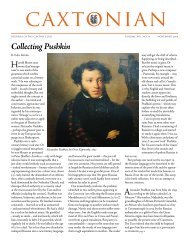July - The Caxton Club
July - The Caxton Club
July - The Caxton Club
Create successful ePaper yourself
Turn your PDF publications into a flip-book with our unique Google optimized e-Paper software.
NON PROFIT ORG<br />
US POSTAGE<br />
PAID<br />
PERMIT 437<br />
AURORA IL<br />
CAXTONIAN<br />
<strong>Caxton</strong> <strong>Club</strong><br />
60 West Walton Street<br />
Chicago, IL 60610<br />
USA<br />
Address Correction Requested<br />
SHERLOCK HOLMES, from page 5<br />
dropped, she attacked the secretary with the<br />
nearest object at hand, a knife.<br />
In the end, everything is neatly wrapped.<br />
<strong>The</strong> woman had already taken poison when<br />
she is discovered. <strong>The</strong> papers are to be taken<br />
by Holmes and Watson to the Russian<br />
embassy to free the wronged lover, and<br />
Holmes explains the final details.<br />
<strong>The</strong> characteristic in all these stories is the<br />
eventual control of conditions which initially<br />
seem uncontrollable. <strong>The</strong> wild November<br />
evening turns into a cool but bright and placid<br />
autumn day, the characters behave according<br />
to their class in society, the criminals, once discovered,<br />
freely admit their motivations for the<br />
crime. <strong>The</strong>re is the brilliant dénouement in<br />
which Holmes ties all the clues together and<br />
explains his thinking. This is also true of other<br />
crime stories. What is so special about these<br />
stories Not the least important is the reader’s<br />
identification with Watson, who is not a really<br />
a bumbler but who responds as we might to<br />
Holmes’ flashes of insight.<br />
An interesting perspective on the popularity<br />
of Sherlock Holmes is offered in Myth and<br />
Modern Man in Sherlock Holmes. <strong>The</strong> book’s<br />
author, David S. Payne, hypothesizes that<br />
the complex processes of modernity, already<br />
engulfing society in the Victorian era but continuing<br />
through the present, brought about<br />
swift changes. This precipitated nostalgia for<br />
a fabricated, stable past. Payne’s theory is that<br />
the Holmes stories provide a method of comprehending<br />
these changes by bracketing them<br />
within a world of traditional virtues, with<br />
characters that portray stereotypes of certain<br />
social classes and cultures.<br />
CAXTONIAN, JULY 2010<br />
In a sense, according to this hypothesis, a<br />
world was created with its own innate<br />
culture and values, which was close enough<br />
to a nostalgic reality of the past to draw<br />
readers from a wide variety of backgrounds<br />
into its mystique. Perhaps Holmes is arguably<br />
the most famous character in English<br />
literature because of that. I would entertain<br />
the notion that a good part of the attraction<br />
of Holmes, and the continuity among the<br />
stories, is his attempt to prove his analytical<br />
skills, his verbal sparring with Watson, and<br />
yes, even his gradually developing humanity.<br />
Two other characteristics, commented upon<br />
by author Colin Wilson in a Holmes anthology,<br />
is Conan Doyle’s passion for factual detail,<br />
providing “an illusion of reality.” Since the first<br />
arguably modern novel, Pamela, by Samuel<br />
Richardson in 1740, defined by Wilson as one<br />
in which the reader can truly identify with a<br />
character, Conan Doyle may have provided<br />
a step forward by combining in Holmes and<br />
his environment, not only a sense of reality,<br />
but the fantasy of wish fulfillment, because of<br />
the absence of despair or defeat, aside from<br />
Doyle’s temporarily killing off Holmes. That<br />
decision was a grave mistake and a large group<br />
of Victorian readers rebelled. <strong>The</strong> readership<br />
remains strong today. This essay alone reflects<br />
the ease of discussing Holmes and his motivations,<br />
almost as if he actually had lived.<br />
To paraphrase a Holmes coda :“Ah, Watson,<br />
draw up your chair and hand me my violin for<br />
some baroque airs, for the only problem we<br />
still have to solve is how to while away these<br />
bleak winter evenings.”<br />
§§<br />
Books Consulted<br />
Sir Arthur Conan Doyle. Sherlock Holmes: <strong>The</strong> Complete<br />
Novels and Stories. paperback, two volumes.<br />
Bantam Books, 1986.<br />
William S. Baring-Gould. Sherlock Holmes of Baker<br />
Street. A Life of the World’s First Consulting Detective.<br />
Bramhall House, New York, 1962<br />
David S. Payne. Myth and Modern Man in Sherlock<br />
Holmes. Gaslight Pubs., Bloomington, Indiana, 1992.<br />
Owen Dudley Edwards. <strong>The</strong> Quest for Sherlock Holmes.<br />
Barnes and Noble, 1983.<br />
Michael Harrison. Sherlock Holmes. A Study in Surmise.<br />
Gaslight Publications, Bloomington Indiana, 1984.<br />
Colin Wilson. “<strong>The</strong> Flawed Superman,” in Michael<br />
Harrison (ed), Beyond Baker Street. A Sherlockian<br />
Anthology. Bobbs-Merrill Company, Inc. Indianapolis/New<br />
York, 1976.<br />
Dan A. Oren. Joining the <strong>Club</strong>. A History of Jews and<br />
Yale. 2d edition. Yale University Press, 2000. p. 152.<br />
Since this talk was delivered, Leslie S. Klinger has<br />
provided us with his three-volume “<strong>The</strong> New<br />
Annotated Sherlock Holmes,” which makes crossreferencing<br />
the Canon ridiculously easy.<br />
Internet Sources<br />
<strong>The</strong> Origins of Sherlock Holmes:<br />
http://www.siracd.com/work_bell.shtml [For description<br />
of Joseph Bell].<br />
http://www.diogenes-club.com/joebell.htm [Tom<br />
McQuain. “Dr. Joseph Bell, a Model for Sherlock<br />
Holmes”].<br />
http://www.sherlock-holmes.org.uk/<strong>The</strong> Sherlock<br />
Holmes Society of London [ material on Joseph<br />
Bell].<br />
Sherlock Holmes and the Scientific Method:<br />
“How Sherlock Holmes and the Scientific<br />
Method Relate to the Book <strong>The</strong> Hounds of<br />
the Baskerville” [sic], http://www.angelfire.<br />
com/bc/SherlockHolmes/<br />
“What is Deduction <strong>The</strong> Steps in the Process.”, http://<br />
www.Sahs.utmb.edu/pellinore/intro_to_research/<br />
wad/deductio .htm<br />
“Sherlock Holmes and Probabilistic Induction.”<br />
[Prof. Uchii], http://www.bun.kyoto-u.ac.<br />
jp/~suchii/holmes_1.html<br />
Ray Betzner, “Sherlock Holmes: Fact or Fiction” (site<br />
no longer available)<br />
Carl L. Heifetz, “Sherlock Holmes: Master of Espionage,”<br />
http://kspot.org/holmes/spy.htm




